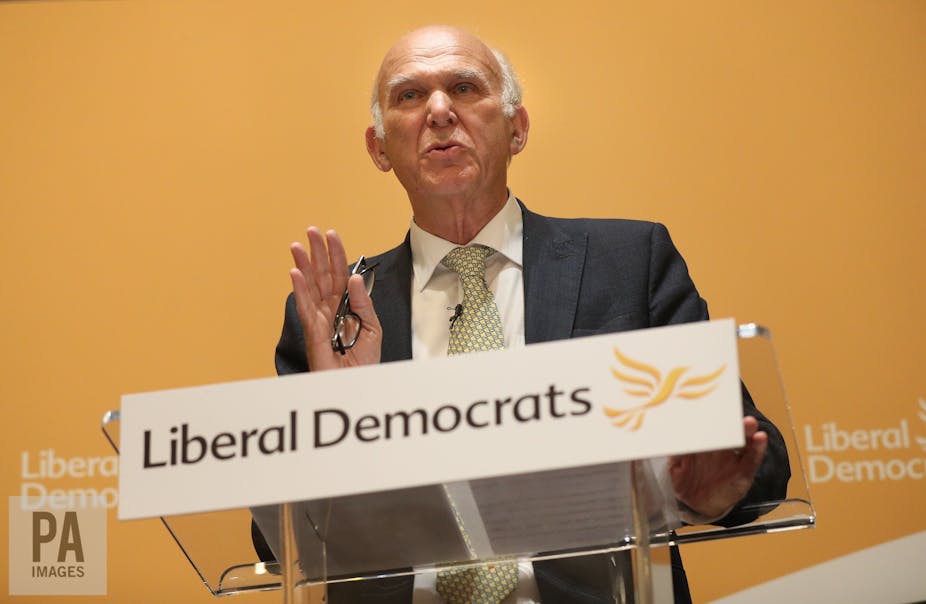Vince Cable has taken over as leader of the Liberal Democrats, following the resignation of former leader Tim Farron. Cable now faces a series of challenges in the uncertain waters of UK politics after the Brexit referendum and general election 2017.
Cable is not a stranger to leadership. In the gap between Menzies Campbell and Nick Clegg in 2007, he stood in. At the time, he was rated for one particular parliamentary performance, when he compared the then prime minister Gordon Brown to both Stalin and Mr Bean. Nor is he a stranger to government. He was known for his repeated warnings on finance before the 2008 crash and later joined the coalition government as secretary of state for business, innovation and skills.
But the challenge now is quite different. He leads a party with just 12 MPs as it tries to make sense of a poor performance in the most recent general election.
Elections ahead
At the top of Cable’s to-do list will be electoral contests, party positioning and Brexit. Each will require nifty footwork – something the new leader, a regular ballroom dancer, will appreciate.
Barring unexpected by-elections, May 2018 will be the first significant electoral test. This sees local elections in a range of authorities, but most notably in the metropolitan districts (places like Liverpool and Manchester) and all the London Boroughs.
In London every single council seat is up for grabs. Local elections in the capital can have a disproportionate effect on media coverage of parties and on morale simply because of where they are. These contests will be seen as highly significant. The problem for the Lib Dems is that, on the whole, these are fights with the Labour party in areas of Labour strength. Cable himself is a London MP (albeit outer London) and will well understand the scale of the task. Unless the current government suddenly becomes very popular, we would expect Labour as the main opposition to gain votes in May 2018 and for parties like the Lib Dems to be squeezed.
What is a Lib Dem these days?
Positioning can be tricky for parties like the Lib Dems. In the past, despite some popular flagship policies (such as a penny on the pound in income tax to fund education), it has been a struggle to achieve definition in the minds of the electorate.
In his time as leader, Farron did manage to make the party more distinct, with a series of initiatives on “risky” topics such as refugees and drugs. And he made very clear calls to hold a second EU referendum. However, the party found that while it may have occupied a reasonably clear position, this was not one particularly liked by the bulk of the voters (or at least did not compete with the other positions on offer).
The Liberal Democrat constitution is in fact very clear about what the party stands for. The problem is often translating this into perceptions which work with the public. Cable will need to think hard about where, in the crowded political marketplace, his party can occupy space.
Brexit means…
The big topic for all UK politicians for the next two years will be Brexit. The government has already changed the length of the parliamentary session to two years to allow time for all the debates that are needed on that issue.
In the most recent election, the Lib Dems were the most overtly pro-EU party. They campaigned to give the public another say on Brexit and aimed to represent the 48% of the voters who wanted to Remain – but within this position there were always tensions.
Cable himself took a more nuanced view on things. He questioned whether freedom of movement within the EU is “tenable or even desirable”, but argued that the issue of access to the single market must outweigh arguments over free movement of people.
Some party members questioned his commitment to the cause as a result of these comments. This is more significant than it might appear. There was an influx of members after the referendum, many of whom wanted to find ways of staying in the EU. However the party and its leader are now faced with the Brexit process and the need to intervene as the repeal bill and other actions are taken in parliament.
The party conference in September will be the first opportunity for real discussion about how the party moves forward on these issues. And the risk is that these may be contradicted or criticised by high-profile commentators such as previous leader Nick Clegg.
Leaders’ speeches at party conferences are always high stakes but Cable faces a particularly difficult task this year. He needs to steer a course on Brexit, work out how to make some kind of impact in the 2018 elections and find that sweet spot on the political position map for his party.

